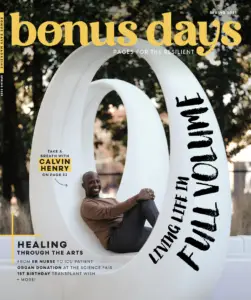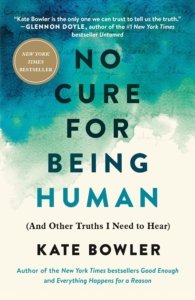Below Are My Favorite Resources
Inspiring But No BS Reading- Books, Blogs, TV Shows and Magazines
Between Two Kingdoms by Suleika Jaouad is a memoir that chronicles her journey from being a young woman with a promising future to battling leukemia in her early twenties. It explores her transition from patient to survivor, grappling with the challenges of life after illness, and embarking on a cross-country road trip to reconnect with the people who supported her along the way.
by Suleika Jaouad is a memoir that chronicles her journey from being a young woman with a promising future to battling leukemia in her early twenties. It explores her transition from patient to survivor, grappling with the challenges of life after illness, and embarking on a cross-country road trip to reconnect with the people who supported her along the way.
 Bonus Days Magazine is a quarterly print publication that shares inspiring stories of resilience, particularly focusing on transplant and chronic illness patients, their families, and donors. Each issue features personal narratives, reflections on gratitude, and insights into navigating life beyond diagnosis, aiming to remind readers of the beauty and potential in every circumstance.
Bonus Days Magazine is a quarterly print publication that shares inspiring stories of resilience, particularly focusing on transplant and chronic illness patients, their families, and donors. Each issue features personal narratives, reflections on gratitude, and insights into navigating life beyond diagnosis, aiming to remind readers of the beauty and potential in every circumstance.
 Dying for Sex, on FX and Hulu, follows Molly and her best friend Nikki — when Molly is diagnosed with terminal cancer, she decides to embrace love, connection, and sexual intimacy in the face of her illness. This miniseries is based on the podcast, Dying for Sex.
Dying for Sex, on FX and Hulu, follows Molly and her best friend Nikki — when Molly is diagnosed with terminal cancer, she decides to embrace love, connection, and sexual intimacy in the face of her illness. This miniseries is based on the podcast, Dying for Sex.
 No Cure for Being Human by Kate Bowler is a memoir about being diagnosed with stage IV cancer in her thirties and how it reshaped her understanding of control, hope, and meaning. With honesty and humor, she challenges society’s obsession with self-improvement and debunks the myths of the self-help industry.
No Cure for Being Human by Kate Bowler is a memoir about being diagnosed with stage IV cancer in her thirties and how it reshaped her understanding of control, hope, and meaning. With honesty and humor, she challenges society’s obsession with self-improvement and debunks the myths of the self-help industry.
![]() Rare Disease Girl,” a blog by Taylor Hoffman, chronicles her journey of living with a rare genetic disorder while navigating the challenges of chronic illness, medical uncertainty, and advocacy.
Rare Disease Girl,” a blog by Taylor Hoffman, chronicles her journey of living with a rare genetic disorder while navigating the challenges of chronic illness, medical uncertainty, and advocacy.
How to Find a Therapist Specializing in Life-Altering, Medically Complex, or Critical Diseases,
Psychology Today
Psychology Today’s Therapist Finder is an effective tool, as it lets you search by location and then narrow the results by selecting “Chronic Illness” under the “Issues” filter. The profiles often include details about the therapist’s specific experience with conditions like cancer, diabetes, or kidney disease.
Associations
Often, searching for associations on Google or Bing, related to your specific condition can help you find support groups and other resources that provide both educational and emotional support.
Your Social Worker
If you’re receiving treatment at a hospital or medical practice, a social worker on staff may be able to connect you with associations, support groups, and therapists in your area who have experience with your condition.
Your Insurance Provider
While insurance doesn’t always cover all mental health services and may have a limited provider network, it’s worth checking what your plan includes and which providers are in-network. An in-network provider is contracted with your insurance and typically offers the highest coverage, while a network-approved or out-of-network provider may still be eligible for partial reimbursement if your insurance allows it. In some cases, you might pay out of pocket and then submit a claim for reimbursement. Many providers also offer sliding scale or reduced fees for self-pay clients, which can make therapy more accessible even if insurance coverage is limited.
How to Create a Living Donor Campaign
![]() Danielle’s Kidney Campaign is the personal page I created to find a donor. I also used this social media post to share my story. Please feel free to use them for copy and content inspiration.
Danielle’s Kidney Campaign is the personal page I created to find a donor. I also used this social media post to share my story. Please feel free to use them for copy and content inspiration.
![]() The Find a Kidney coaching program mentors kidney patients in finding a living donor, offering support with outreach, storytelling, and microsite creation. I haven’t used this resource myself, and it’s only available to those registered with the National Kidney Registry.
The Find a Kidney coaching program mentors kidney patients in finding a living donor, offering support with outreach, storytelling, and microsite creation. I haven’t used this resource myself, and it’s only available to those registered with the National Kidney Registry.
![]() The National Kidney Foundation offers a webpage and an online course on finding a living donor, providing a comprehensive overview of the process, available resources, mentorship opportunities, and strategies for running a successful campaign. While the course is excellent for beginners, those with more advanced social media skills may find it fairly introductory.
The National Kidney Foundation offers a webpage and an online course on finding a living donor, providing a comprehensive overview of the process, available resources, mentorship opportunities, and strategies for running a successful campaign. While the course is excellent for beginners, those with more advanced social media skills may find it fairly introductory.
![]() The National Kidney Registry’s Find a Donor program helps patients connect with potential living donors through educational resources, donor search tools, mircrosites, and personalized support. However, it only works with select transplant hospitals, so eligibility depends on where a patient is receiving care.
The National Kidney Registry’s Find a Donor program helps patients connect with potential living donors through educational resources, donor search tools, mircrosites, and personalized support. However, it only works with select transplant hospitals, so eligibility depends on where a patient is receiving care.
Organizations That Match Living Donors with Recipients
Educational Resources for Individuals Living with Kidney Disease
Living Donation FAQS
Where can I learn more about being a donor?
If you’re looking for an overview, check out the National Kidney Foundation and the American Society of Transplantation.
What is life like with one kidney?
It is very similar to life with two kidneys—there are usually no long-term medical issues and if there is; you are placed at the top of the kidney transplant list.
How are the medical evaluation and surgery handled?
You will have your own independent medical team and coordinators who will advise and protect you throughout the entire process. To be considered as a potential kidney donor, you will undergo an extensive evaluation and meet with a comprehensive medical team. This includes a dietitian, independent living donor advocate, financial coordinator, nephrologist, nurse coordinator, pharmacist, psychiatrist, social worker, and surgeon. They will conduct blood and urine tests, as well as a CT scan, chest X-ray, EKG, and a mammogram for women.
What are the costs?
All medical costs, including surgery and follow-up care, will be covered by my insurance, and additional support is available for lost wages and travel expenses.
Does FMLA cover kidney donation?
Yes, the Family and Medical Leave Act (FMLA) does cover kidney donation. Under FMLA, eligible employees can take up to 12 weeks of unpaid, job-protected leave for serious health conditions, which includes organ donation. This means that if you are donating a kidney, you can take time off work to recover without fear of losing your job. To learn more, please click here.
